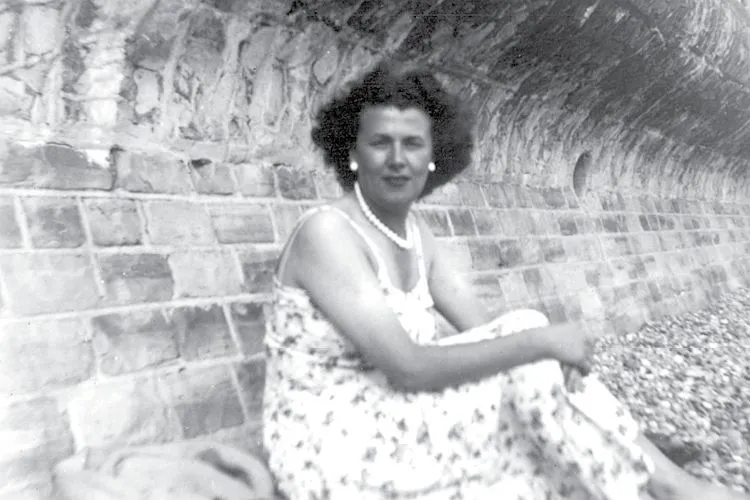Being neighbors, Mom and Dad had been aware of each other for years, but only on shyly-passing acquaintance terms. Dad was good pals with Mom’s brothers, Sid and Alf, and one night, at the Billesley Arms, a plan was hatched by the three of them.
The following bright November Saturday morning, Dad strode down the block to the Harts’ house and knocked on the front door. Familiar as he was to the family there, he was immediately invited in. But he was not there this time to ask Sid if he fancied going fishing tomorrow, or to ask Alf if he had a game of bowls lined up later on up at the Billesley. He was there to ask old Joe Hart if he could take his younger daughter, Eugenie, out on a date.
I don’t think either of my parents had great expectations about love and marriage. They were both practical people. They each wanted a family and to not grow old alone. They would have both felt enormous gratitude to have been wanted and accepted by the other but would never have expressed it in quite that way.
From the first date, they knew they were a good fit, and all their friends and family knew it too. In their community, their partnership was a symbol of survival in the aftermath of the war: two working-class families giving up their youngest to each other. Their marriage would be a source of great pride to many.
The forty-two guests at the wedding all lived within a few miles of one another. When I was ten almost all of them were in my life; they were the fabric that formed me. They were good, honest, and loving folk. I was raised to love them as they loved me—nonjudgmentally and unconditionally. There is something about my parents’ wedding that represents the apogee of English working-class family life.
There was a shortage of new, affordable homes in the 1950s, another legacy of the war, so after Mom and Dad married, they moved in temporarily with Mom’s parents.
They would soon become part of the working-class diaspora that was moving out of the inner cities into the new housing estates and “garden cities” that were being built to replace the bombed-out town centers and to accommodate the exploding population. The story would be told many times about how Dad had shown up at the site office of one new development in Hollywood at 7:00 A.M. on a Monday morning in 1954, demanding to be allowed to buy the last house available.
The new house was perfect. It was a two-up, two-down, with a roughcast relief between the ground floor and upstairs bow windows. The living room, where we would eat, watch TV, sit, do just about everything, was 8 by 12 feet. The other room downstairs was known as the “front room,” and it was where the wedding gifts and the alcohol were stored. The three of us would have lunch in there every Sunday, and it’s where the Christmas tree was put up every year. Other than that, it went unused.
Number 34 Simon Road had its own garage, where my father would spend weekends tinkering with his car. There was a small garden at the front and a slightly larger one at the back.
In June of 1960, Mom gave birth to me at Sorrento Maternity Hospital in Solihull after an easy labor. I was never any trouble, she would tell me. I was soon brought back from the hospital, by which point the house was well lived in and comfortable, perfectly snug for a newborn.
My parents named me Nigel. It was quite an unconventional choice. My second name was John.

3 Sounds for the Suburbs
Living in the suburbs was fine for Dad. More than fine. He jumped into his Ford every morning at eight, drove himself to his job in export sales at Wilmot-Breeden, an engineering and manufacturing firm that made car parts, and was back home around six. He even got to make trips abroad, primarily to Sweden, handling the firm’s accounts with Volvo and Saab. Those trips were infused with romance and glamour for me. He would return home smelling of cigars, airport lounges, and expensive alcohol, with gifts of perfume for Mom and toys for me.
1 comment